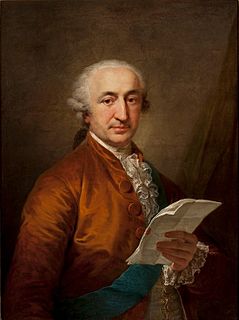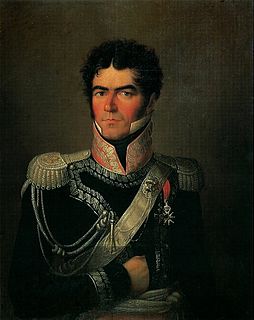 W
WMatheus Butrymowicz (1745-1814) was a Polish-Lithuanian statesman and landlord from Pinsk and a liberal member of the Great Sejm or Diet assembled in Warsaw from 1788 to 1792.
 W
WCelestyn Czaplic (1723–1804) of the Kierdeja coat of arms was a Polish–Lithuanian szlachcic, politician, writer and a poet. Remembered for his humorous poetry and impeccable moral character, he was a deputy to numerous Sejms of the Polish–Lithuanian Commonwealth, and a marshal of the Sejm of 1766. He held the offices of podczaszy, podkomorzy, and finally, from 1773, of the Master of the Hunt of the Crown. He was the recipient of the Order of Saint Stanislaus and the Order of the White Eagle.
 W
WMichał Ambroży Kochanowski (1757–1832) was a Chamberlain of Stanisław August Poniatowski since 1778; deputy to the Great Sejm (1788–1792), councillor of Diplomatic Section of Provisional Temporary Council, member of the Supreme National Council during the Kościuszko Insurrection (1794), member of the government in the Duchy of Warsaw (1808–1815), senator, castellan and voivode in the Congress Poland since 1816, member of the Administrative Council during the November Uprising in 1831.
 W
WFeliks Walezjusz Władysław Łubieński was a Polish politician, jurist, Minister of Justice in the Grand Duchy of Warsaw, starosta of Nakieł, a member of the Friends of the Constitution and a Prussian count. With the Code Napoleon, he introduced civil marriage and divorce in traditionally Catholic Poland.
 W
WCount Stanisław Małachowski, of the Nałęcz coat-of-arms was the first Prime Minister of Poland, a member of the Polish government's Permanent Council (1776–1780), Marshal of the Crown Courts of Justice from 1774, Crown Grand Referendary (1780–1792) and Marshal of the Four-Year Sejm (1788–1792).
 W
WStanisław Mokronowski (1761-1821) was a prominent member of the Polish landed gentry of Bogoria coat of arms. A general of the Polish Army and a royal Chamberlain, Mokronowski took part in both the Polish–Russian War of 1792 and Kościuszko's Uprising of 1794.
 W
WFryderyk Józef Jan Kanty Moszyński of Nałęcz coat of arms was a noble (szlachcic) in the Polish–Lithuanian Commonwealth. He held the offices of Referendary of Lithuania, Great Secretary of Lithuania and Great Marshal of the Crown.
 W
WJulian Ursyn Niemcewicz was a Polish poet, playwright and statesman. He was a leading advocate for the Constitution of 3 May 1791.
 W
WCount Jan Potocki was a Polish nobleman, Polish Army Captain of Engineers, ethnologist, Egyptologist, linguist, traveler, adventurer, and popular author of the Enlightenment period, whose life and exploits made him a legendary figure in his homeland. Outside Poland he is known chiefly for his novel, The Manuscript Found in Saragossa.
 W
WPrince Eustachy Erazm Sanguszko (1768–1844) was a Polish nobleman, general, military commander, diplomat and politician.
 W
WAleksander Michał Paweł Sapieha of Lis coat of arms was a noble of the Polish-Lithuanian Commonwealth.
 W
WPrince Kazimierz Nestor Sapieha (1757–1798) was a Polish-Lithuanian noble (szlachcic) and one the creators of the 3 May Constitution.
 W
WStanisław Sołtyk was a Polish nobleman (szlachcic), political activist, landowner, father of Roman Sołtyk.
 W
WTomasz Antoni Wawrzecki (1753–1816) was a distinguished Polish politician and military commander, a general of the Polish Army. During Kościuszko's Uprising in Warsaw he succeeded Tadeusz Kościuszko as the commander of the Polish forces. His surrender to the Russian troops on 16 November 1794 marked the effective end of the uprising.
 W
WZenon Kazimierz Wysłouch (1727–1805) was a chamberlain of the Brzeskie Voivodeship and a member of the Great Sejm.
 W
WJózef Zabiełło h. Topór of was a nobleman (szlachcic) in the Polish–Lithuanian Commonwealth. Great Łowczy of Lithuanian from 1775, konsyliarz of Permanent Council from 1782, deputy of Samogitia to the Great Sejm and Field Hetman of Lithuania from 1793, he was infamous for his support of the Russian Empire in the last years of the Commonwealth.
 W
WPrince Józef Zajączek was a Polish general and politician.
 W
WIgnacy Wyssogota Zakrzewski (1745–1802) was a notable Polish nobleman, politician, art collector, Freemason, and the Mayor of Warsaw during the last years of the Polish–Lithuanian Commonwealth, in 1792 and 1794.